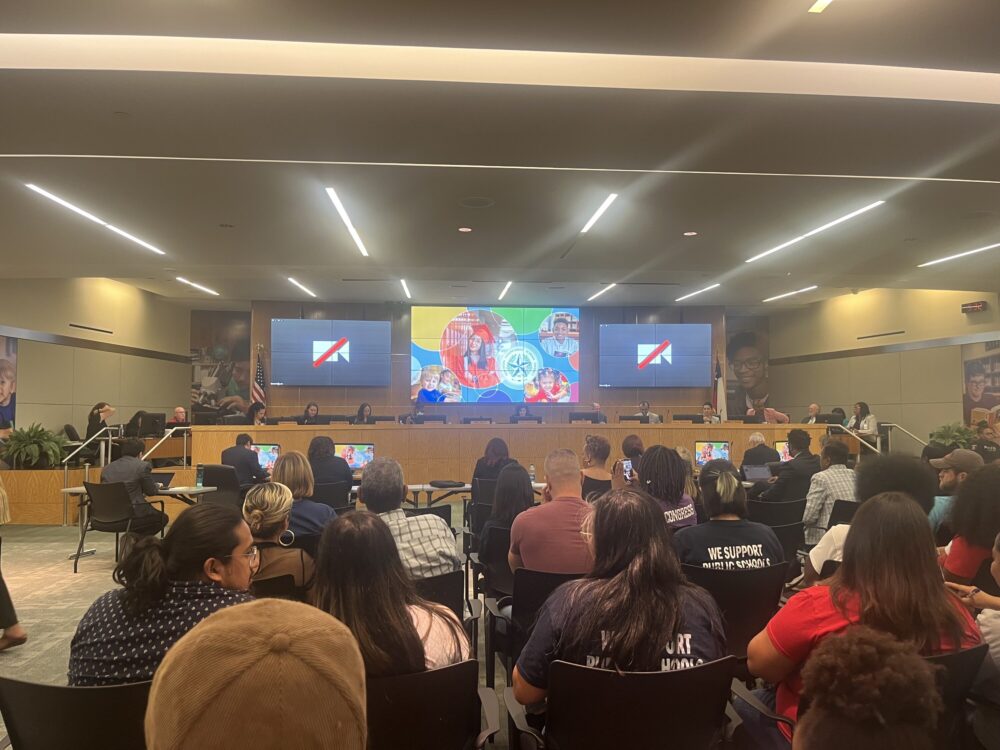
HISD's Board of Managers unanimously voted Thursday night to approve the proposed 2.2 billion-dollar budget for the 2023-2024 school year. The plan involves substantial cuts to central office staff and the district's vendor contracts.
The night's registered speakers voiced myriad concerns that have been echoed for weeks, including a lack of elected representation, too narrow a focus on test scores and Miles's New Education System unfairly targeting communities of color.
Several attendees were concerned for the fate of the district's wraparound services.
"In order for you to be able to learn, you have to have your basic needs met," said Elizabeth Santos, former HISD trustee. "The wraparound specialists were the framework for the community schools model."
However, Miles promised that wraparound specialists will remain in schools this year and wraparound services themselves would be expanded.
"One of the things that HISD does well is wraparound services," said Miles. One of Miles's plans for the district includes the formation of six "Sunrise Centers" to support students and families with needs outside the classroom. He said these will be in addition to wraparound services as they already exist in the district.
Also as a part of the unanimously approved budget, HISD will spend $8.7 million on expanding leadership density, $16 million on improving the safety of facilities, and $19.7 million on implementing the NES program at 29 schools, where teachers will be paid an average of over $80,000 per year, in addition to a $10,000 stipend.
Miles claimed that in addition to the 29 NES schools, principals from other schools in the district have come to him interested in implementing similar reforms at their campuses.
"They came up to me last week, dozens of them, said they wanted to do NES, and I wasn’t planning on it," said Miles. "But we’re considering allowing them to do the NES system on a totally voluntary nature.”
Miles did not have a specific number of principals that came to him with such a request, but he said that principals who decide to do so may become "NES-aligned schools," with similar programming to the 29 schools in the New Education System. While he said he encouraged principals to consult teachers and parents before making a decision, he said the ultimate say lies solely with school principals. He is asking that interested principals make a decision by next week. Depending on how many schools opt in to the program, an amendment to the budget may be proposed.
Despite concern Miles would end the "hold harmless" provision on school funding and small school subsidies, he said those will remain in place for the coming school year, though they're likely to be reassessed next year.
The budget includes $22.6 million for improvements to special education, which will take place across the district. Those include a pay raise for teachers, with a minimum salary of $80,000 for special ed teachers and $55,000 for special ed teaching support staff.
The elected board of trustees is split in its support of Miles's budget, which they were invited to speak with Miles about in a zoom meeting Thursday morning.
Former trustee Judith Cruz said cuts to the central office were overdue.
"It's a pretty big shift from several of the previous administrations," she said. "We have bloated central office and gradually starved schools over at least the past decade and what he is proposing is moving away from that."
However, former trustee Elizabeth Santos said Miles's presentation left her feeling uneasy.
"The only thing I feel he got right is that there needs to be a systemic approach to education," she said. "Established practices can be killed off by reform even if the reforms are worse."
Santos complained that Miles is treating the district too much like a business, and in doing so, dehumanizing students and community members.
"He's approaching this as a business, which is completely disconnected from established pedagogy," she said. "He is not connecting to a vision that Houston has for its children."
After some discussion, the board also unanimously approved a suspension of the board's current policy regarding magnet schools, allowing for changes to be made to magnet programs at 12 of the schools included in the NES program.
Miles promised that the majority of NES schools would be able to continue their programming, even if not officially named as a magnet program.
"We're going to accommodate magnet programs in NES schools and provide for more experiences, more programs," he said. "Out-of-zone folks can continue to go there and know that their kids are getting those programs."
All of the public meeting's other agenda items were unanimously rubber-stamped without public discussion.
Ultimately, Miles aims to implement "wholescale, systemic reform," similar to that being enacted in the 29 NES schools, in 150 of the district's campuses by 2030.
Hear more from Rebecca Noel discussing the HISD meeting on Houston Matters:

 66 °F
66 °F